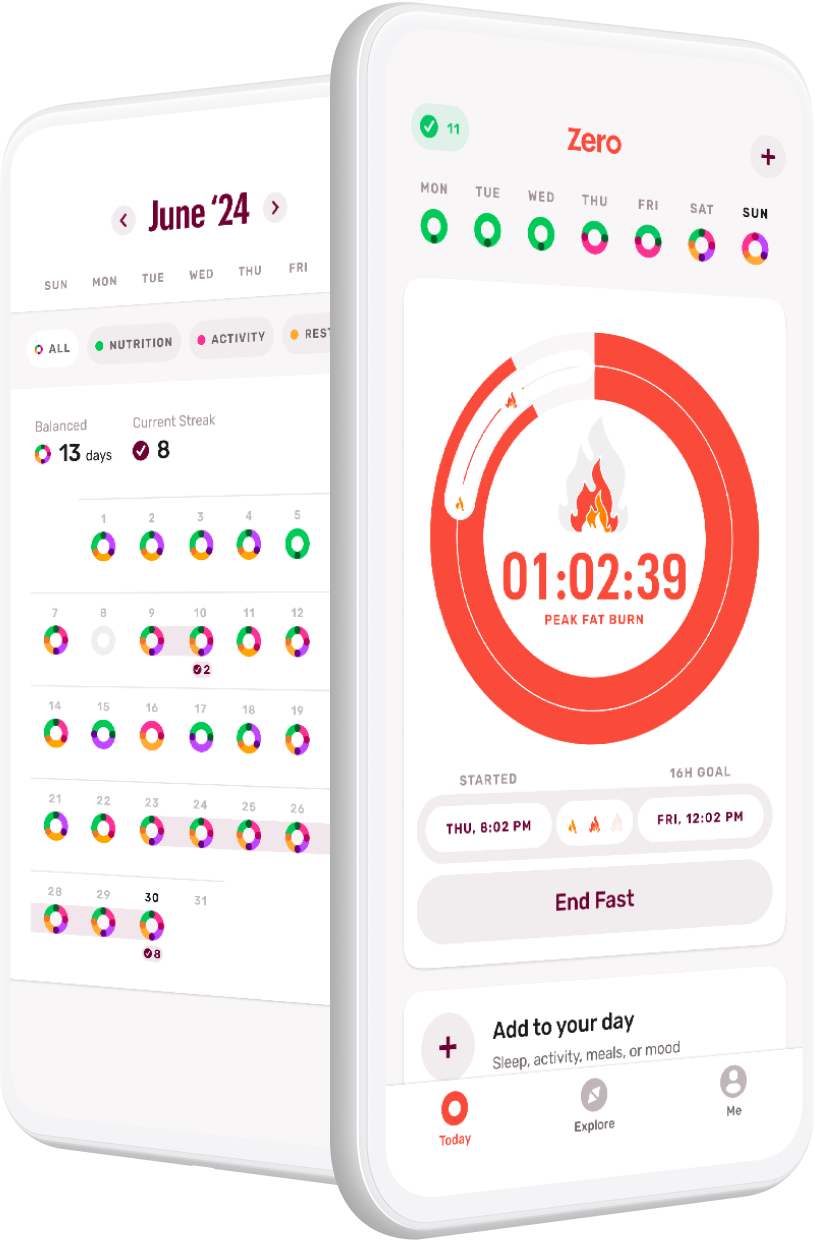Written and medically reviewed by Rich LaFountain, PhD
Your thyroid is a key player in achieving weight loss and metabolic health. You need it to stay healthy and function properly to meet these goals. However, you might have heard that intermittent fasting — an effective tool for losing weight and improving metabolic health — can disrupt your thyroid. This is a myth! Read on to debunk this and other thyroid-and-fasting-related inaccuracies and to better understand how fasting does (and does not) impact your thyroid health.
Why Is Thyroid Health So Important?
The thyroid is a small, butterfly-shaped gland located at the base of your neck, just below your Adam’s apple. Despite its small size, it plays a crucial role in regulating numerous bodily functions through the production of thyroid hormones. Your thyroid helps to regulate your metabolism, body temperature, heart rate, blood pressure, growth, energy levels, mood, and even mental health. Furthermore, research indicates that thyroid health and hormones are involved in regulating body weight, appetite, and the way your body either burns or builds fat stores.
However, when it comes to thyroid function and your health, it’s not entirely a one-way street. Lifestyle habits like fasting can impact thyroid function, so it’s important to consider how that interplay may (or may not!) be influencing other aspects of your health and well-being.
Debunking Popular Myths About Fasting and Thyroid Health
Many of the most common myths involving fasting and thyroid health suggest that fasting will harm your thyroid function. These myths likely arose from early “fasting” studies that more closely approximated starvation research, where participants did not eat for weeks at a time. These studies were helpful in establishing how the body fuels itself in the absence of incoming calories, but they are not representative of today’s popular intermittent-fasting patterns that involve fasts lasting 12–18 hours.
“Many people confuse fasting with starvation,” says Dr. Naomi Parrella, Zero’s Chief Medical Officer. “Fasting is a choice. It is done deliberately for a purpose, and it can be adjusted. Importantly, there is a reassuring known end time when there will be access to food and drink. Because of that, panic is not part of fasting.”
Starving, on the other hand, is not a choice. “There may not be a known end, which leads to significant stress and disordered thought patterns and behaviors. If starvation continues for too long, the body starts to shut down functions to try to survive. All hormone levels begin to drop, and mood and energy also plummet. This is not fasting.”
In large part due to confusion over fasting vs. starvation, here are three of the most widely propagated myths about fasting and thyroid function, and why they aren’t true.
Myth #1: Fasting Causes Hypothyroidism
One of the most common beliefs is that fasting can lead to hypothyroidism, or an underactive thyroid. Hypothyroidism is a condition where the thyroid makes insufficient thyroid hormone, and it manifests as the body “turning down” metabolism, or the rate at which you burn energy. When it does this, you’re likely to gain weight and experience fatigue, poor concentration, and even depression.
Severe, prolonged calorie restriction or dietary protein deficiency with or without fasting may contribute to hypothyroidism; however, fasting itself does not cause hypothyroidism unless it’s also paired with a consistent energy deficit and inadequate nutrition. In reality, hypothyroidism — which affects up to 5% of the general population with an estimated 5% remaining undiagnosed — is primarily caused by autoimmune thyroid disorders (such as Hashimoto’s thyroiditis), iodine deficiency or treatment, surgical removal of the thyroid, certain medications or supplements, or other underlying medical conditions.
Myth #2: Fasting Negatively Affects Thyroid Health and Function
Prolonged fasts, lasting 24 to 48 hours or more, and calorie restriction may temporarily suppress thyroid-hormone production as your body responds by conserving energy. However, upon returning to adequate nutrition, your thyroid levels typically return to normal levels rapidly.
Typical intermittent-fasting schedules that rely on a 12–18-hour overnight fasting window may also reduce thyroid hormone levels, although data are mixed. One study in healthy, resistance-trained participants looked at the effect of following a daily 16:8 fasting pattern (fasting for 16 hours, eating within the other 8 hours) over 8 weeks. Compared to the control group who followed their ordinary eating patterns, the 16:8 group saw a decrease in triiodothyronine (T3, the active form of thyroid hormone) but not in thyroid-stimulating hormone (TSH, the hormone that prompts the thyroid to release T3).
Another research trial in young adults with overweight and obesity compared the effect of a 18:6 fasting pattern on thyroid hormones. One group’s 6-hour eating window was early (7 a.m. to 1 p.m.), another group’s 6-hour eating window was more typical (12 p.m. to 6 p.m.), and the control group ate ad libitum. In the early group, both T3 and TSH were depressed at 4 weeks, but by 8 weeks their levels normalized. The “typical” fasting group saw no hormone reduction, nor did the control group. Notably, both fasting groups saw significant bodyweight loss compared to the control group.
In sum, fasting might temporarily affect your hormone levels, but often only temporarily. What’s more, there is actually some evidence that modest reductions in thyroid-hormone levels are associated with longevity benefits!
Myth #3: Fasting Makes Thyroid Conditions Worse
People with pre-existing conditions such as hypothyroidism (an underactive thyroid) or hyperthyroidism (an overactive thyroid) may worry that fasting might exacerbate their condition. If this is you, your worry may be for naught!
For those treating hypothyroidism, thyroid replacement medication must be taken on an empty stomach for appropriate absorption and dose effect. This means taking the medication during a fasting window. And while that window is in the morning for many people, it’s not the case for everyone.
“In our clinics, some people have fasting practices, like Ramadan (fasting from sunrise to sunset), that may change their eating window so that early morning is no longer the fasted time to take thyroid medication,” says Dr. Parrella. As a result, these individuals will often shift when they take the thyroid medication to later in the day—so they can take it at the optimal time during their fast to get the most benefit from the medication.
If you have a thyroid disorder, you should consult your doctor or another healthcare provider before starting any fasting regimen to ensure it’s safe and appropriate for you specifically.
So, How Does Fasting Help with Thyroid Health?
To answer this question, it’s important to again distinguish between different styles of fasting. Regularly fasting for 12–18 hours is shown to improve metabolic health and, as a result, can protect your thyroid health. Alternatively, because of the higher energy demands and stress associated with prolonged fasts of 48 hours or more, the risk-benefit ratio skews considerably more towards risk. Put another way, responsible 12–18-hour fasts with Zero impact your thyroid differently than prolonged fasts lasting multiple days, so when we say “fasting” in what follows, we’re referring to those 12–18-hour fasts.
If you’re fasting with Zero, here are some fasting-specific benefits that can improve thyroid health.
Weight Management
Excess adipose tissue can increase stress on thyroid-hormone regulation. Therefore, losing weight by regularly reaching a fat-burning state with 12–18-hour fasts may help improve thyroid function, especially in individuals with obesity.
Insulin Sensitivity
Population-level study data indicate that both hypo and hyperthyroidism are linked with disruptions to blood-sugar management and insulin sensitivity. So, an intervention that’s effective at improving blood-sugar control and insulin sensitivity — such as intermittent fasting — could help mitigate those conditions. In fact, a recent review of intermittent fasting’s effects on hormones suggests exactly this: intermittent fasting and time-restricted feeding for 12 weeks or less improve metabolic health and insulin sensitivity, which may contribute to thyroid health.
Inflammation Reduction
Chronic inflammation is associated with various thyroid disorders, including autoimmune thyroid conditions like Hashimoto’s thyroiditis and Graves’ disease, and intermittent fasting is considered a promising dietary intervention for managing autoimmune diseases. Fasting has been shown to reduce inflammation markers in the body, which may help alleviate symptoms associated with thyroid conditions. Furthermore, fasting can help reduce fat mass which is associated with chronic inflammation and poorer thyroid-health outcomes.
Cellular Cleanup (Autophagy)
Fasting triggers a cellular process called autophagy, which involves the removal of damaged or dysfunctional cells and cellular components. Some research suggests that autophagy may help improve thyroid health by promoting the elimination of damaged or cancerous thyroid cells. This is important not only to prevent cancer, but also to keep the downstream targets of thyroid hormones — i.e., most of the organs in your body and especially muscle — healthy.
Conclusion: Responsible Fasting Can Help You Improve Thyroid Health
It’s clear that many of the common myths associated with fasting and thyroid health do not apply to 12–18-hour fasts that align with circadian rhythms — in fact, the potential benefits of this type of intermittent fasting for thyroid health are numerous. You can get started building an effective fasting practice with Zero, and by doing so, you’ll establish a healthy lifestyle that can improve your thyroid health and function.
- Debunking 3 Myths Around Fasting and Thyroid Health - April 15, 2024
- Breaking Down Fast Breakers: How to Tell If Something Will Break Your Fast - March 4, 2024
- GLP-1s and Weight-Loss Medications vs. Lifestyle Interventions: What’s Right for You - February 5, 2024

